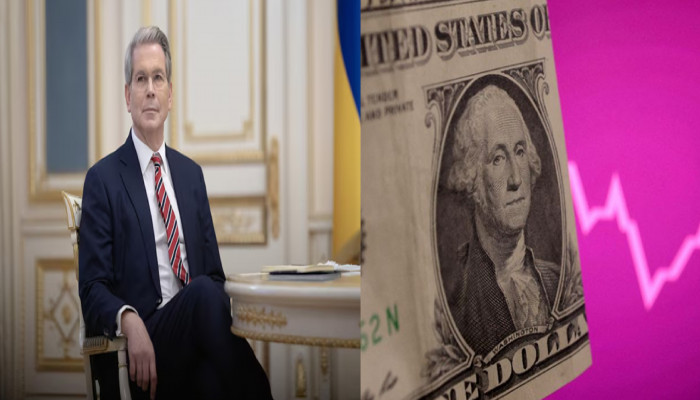Dollar soars as Bessent forecasts easing of US-China trade tensions
- In Reports
- 12:59 PM, Apr 23, 2025
- Myind Staff
The dollar gained some strength on Tuesday after US Treasury Secretary Scott Bessent mentioned in a private meeting that he expects a reduction in US-China trade tensions.
Bessent said that neither the US nor China thinks the current situation can continue and emphasised that the Trump administration's goal is not to separate the two largest economies in the world, according to someone who attended his talk at a JP Morgan conference. The US dollar index, which tracks the value of the dollar compared to six other major currencies, rose by 0.6% to reach 98.937. This came after it dropped to as low as 97.923 in the previous session, a level not seen since March 2022.
"There are signs that pressure is mounting on the White House to calm things down," said Adam Button, chief currency analyst at ForexLive. On Tuesday, the dollar remained near its lowest levels in years against the euro and Swiss franc, as President Donald Trump criticised the Federal Reserve. His attacks sparked concerns about the independence of the central bank.
These concerns about the Fed's independence could affect the dollar's strength as a global reserve currency. Analysts pointed out that this may lead to investors pulling back from what they see as too much investment in US assets. On Monday, Trump increased his criticism of Fed chief Jerome Powell, calling him a "major loser" and insisting that he cut interest rates "NOW" to avoid an economic slowdown. "The firing of Jerome Powell would be catastrophic for the US dollar and confidence in US capital markets in general," said Button.
On Friday, White House economic adviser Kevin Hassett mentioned that the president and his team are still looking into whether they can dismiss Powell. This comes after Powell said last week that the central bank can take its time to set its policies.
"The current worst-case scenario for the greenback is that Powell caves in and delivers an emergency rate cut, although that remains a low-probability event," said Francesco Pesole, strategist at ING. Barclays raised its euro/dollar forecast to $1.15, believing that the removal of the Fed chair is unlikely. However, they warned that they may need to revise the forecast again if the situation changes. On Monday, China accused the U.S. of misusing tariffs and cautioned other countries against making a broader economic deal with the U.S. that could harm them. The dollar rose by 0.42% to 141.470 yen, after earlier dropping below the key 140 level for the first time since mid-September. While some experts think the U.S. may push Japan to help strengthen the yen, Japan feels there’s little it can do directly.
"Underlying dynamics differ and the yen's rise looks more fragile than the euro's," stated BofA Japan forex strategist Shusuke Yamada, following the announcement that both currencies had gained roughly 12% vs the US dollar for the day. "The yen's rise has accompanied a bigger rise in speculative positioning and increasing focus on a potential US-Japan currency deal," while "structural outflows from Japan have gone out of market radar," he added.
The US dollar increased by 1.17% to reach 0.819 Swiss franc, after hitting a 10-year low of 0.8042 in the previous session. Meanwhile, the euro dropped by 0.73% to $1.1424, following a rise to $1.1573 on Monday, its highest level since November 2021.







Comments